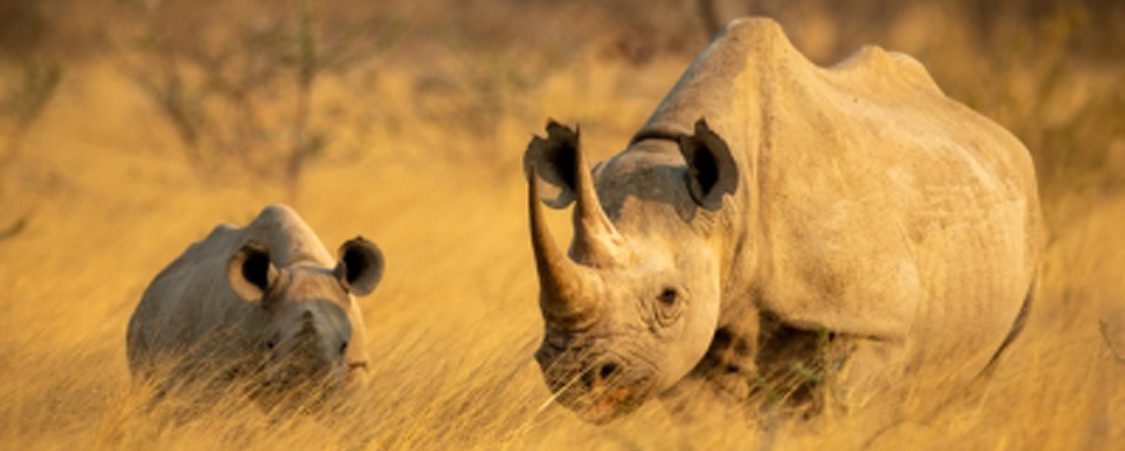The World Bank (International Bank for Reconstruction and Development, IBRD) launched a Wildlife Conservation Bond (WCB), generating 150 million dollars in support of South Africa’s efforts to conserve and grow the population of endangered black rhinos.
The five-year Sustainable Development Bond includes a potential performance payment from the Global Environment Facility (GEF), which will contribute to protecting and increasing black rhino populations in two protected areas in South Africa, the Addo Elephant National Park, and the Great Fish River Nature Reserve.
The WCB is a first-of-its-kind, outcome-based, financial instrument that channels investments to achieve conservation outcomes – measured in this case by an increase in black rhino populations.
Rhinos are considered an umbrella species that play a crucial role in shaping entire ecosystems on which countless other species depend. Through the WCB, investors are supporting the financing of activities to protect and grow a critically endangered species with clear conservation targets, contributing directly to biodiversity, and bringing jobs to local communities through the creation of conservation-related employment in a rural and underserved region of South Africa
World Bank Group President David Malpass said, “The Rhino Bond is a groundbreaking approach to enabling private sector investment in global public goods — in this case biodiversity conservation, a key global development challenge.”
He continued, saying that, “The pay-for-success financial structure protects an endangered species and strengthens South Africa’s conservation efforts by leveraging the World Bank’s infrastructure and track record in capital markets. Importantly, it can be replicated and scaled to channel more private capital for other conservation and climate actions and development objectives around the world.”
Investors in the WCB will not receive coupon payments on the bond. Instead, the issuer will make conservation investment payments to finance rhino conservation activities at the two parks. If successful, as measured by the rhino growth rate independently calculated by Conservation Alpha and verified by the Zoological Society of London, investors will receive a success payment at maturity, paid by the IBRD with funds provided by a performance-based grant from the GEF, in addition to principal redemption of the bond. This represents a new approach in conservation financing that passes project risks to capital market investors and allows donors to pay for conservation outcomes. Credit Suisse was the sole structurer and joint bookrunner with Citibank.
Rhino protection helps other species that share their habitat. This ecosystem contributes to South Africa’s national economy through tourism, job creation, and as an important source of foreign exchange. However, black rhinos are critically endangered mainly due to poaching and habitat loss.
The Minister of Forestry, Fisheries and the Environment, Minister Barbara Creecy, said, “As South Africa we are excited to be at the forefront of an innovative new financial instrument aimed at boosting our efforts to protect the world’s largest rhino population. We would like to acknowledge and express our appreciation for the considerable effort by numerous role players over the last few years that has resulted in this much-needed injection of funding into the biodiversity sector. We are confident that this will assist in increasing the rhino growth rate and stimulate the development of additional novel market-based mechanisms to support the objectives of the New Deal for People with Nature. South Africa is committed to securing nature’s contribution to people through well-managed and expanding Conservation Areas that contribute to inclusive rural economic growth in thriving Biodiversity Economy Nodes.”
Conservation investment payments from the WCB allow South Africa to build on established and successful rhino conservation efforts at AENP and GFRNR. These parks were selected for this pilot transaction based on their ecological, managerial, and financial capacity to achieve rhino conservation outcomes. The conservation efforts at these parks strengthen ecosystem services like clean water and habitats for pollinators that serve the local citrus industry.
ECPTA Chief Executive Officer, Vuyani Dayimani said, “This bond will significantly increase the funding for the Great Fish River Nature Reserve, which is much-needed to scale up activities to protect and grow our rhino populations and increase benefits to local communities and the economy. Funding will support increased staffing and training, improved national and regional coordination, as well as investments in equipment, infrastructure, and technology.”
“This bond will support important conservation efforts at Addo Elephant National Park and help fill funding gaps due to a reduction in tourism due to the COVID-19 pandemic,” said SANParks acting CEO Dumisani Dlamini.











